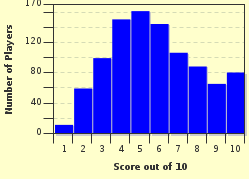Quiz Answer Key and Fun Facts
1. What causes most thyroid disease in the US?
2. What gland(s) regulate the thyroid gland?
3. Thyroid hormone interacts with receptors in which part of the cell?
4. Which of the following is NOT a common symptom of hypothyroidism, in which the thyroid gland is underactive and makes too little thyroid hormone?
5. Which of the following is NOT a common symptom of hyperthyroidism, in which the thyroid gland is overactive and makes too much thyroid hormone?
6. T3 and T4 are shorthand names for the two active forms of thyroid hormone. To what do the 3 and 4 refer?
7. How many thyroid glands does a person normally have?
8. In what form is most thyroid hormone found in the bloodstream?
9. What other hormone is made in the thyroid gland?
10. Thyroid cancer occurs at increased rates in individuals who have been exposed to the high levels of radiation which may occur after a nuclear accident or nuclear bomb detonation. What salt can be used to reduce the risk of thyroid cancer in the event of fallout exposure?
Source: Author
Suerreal
This quiz was reviewed by FunTrivia editor
crisw before going online.
Any errors found in FunTrivia content are routinely corrected through our feedback system.


